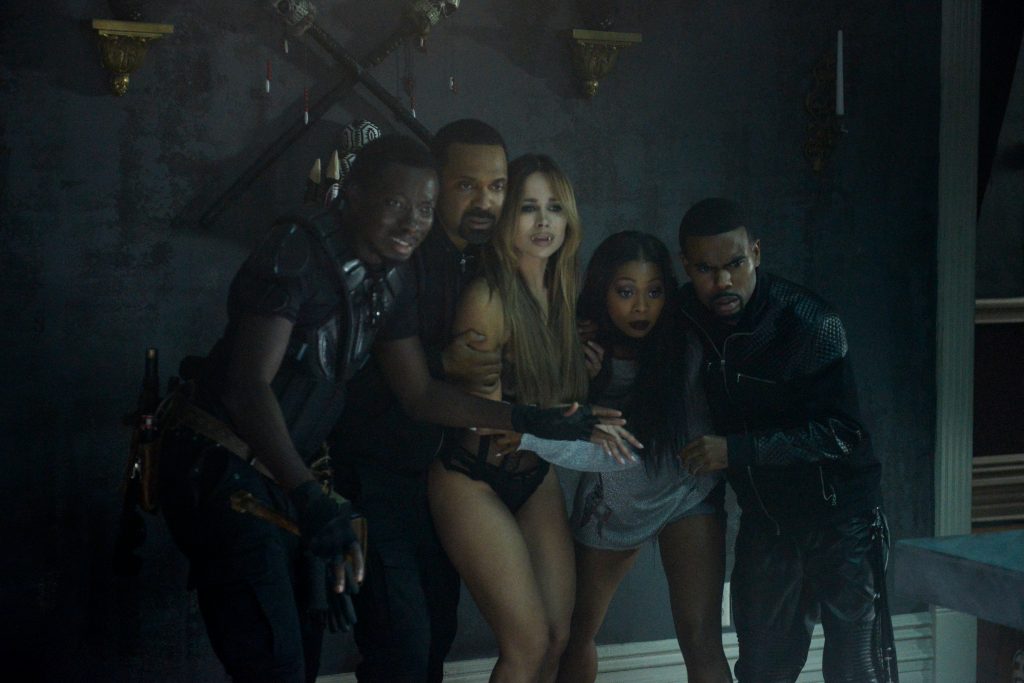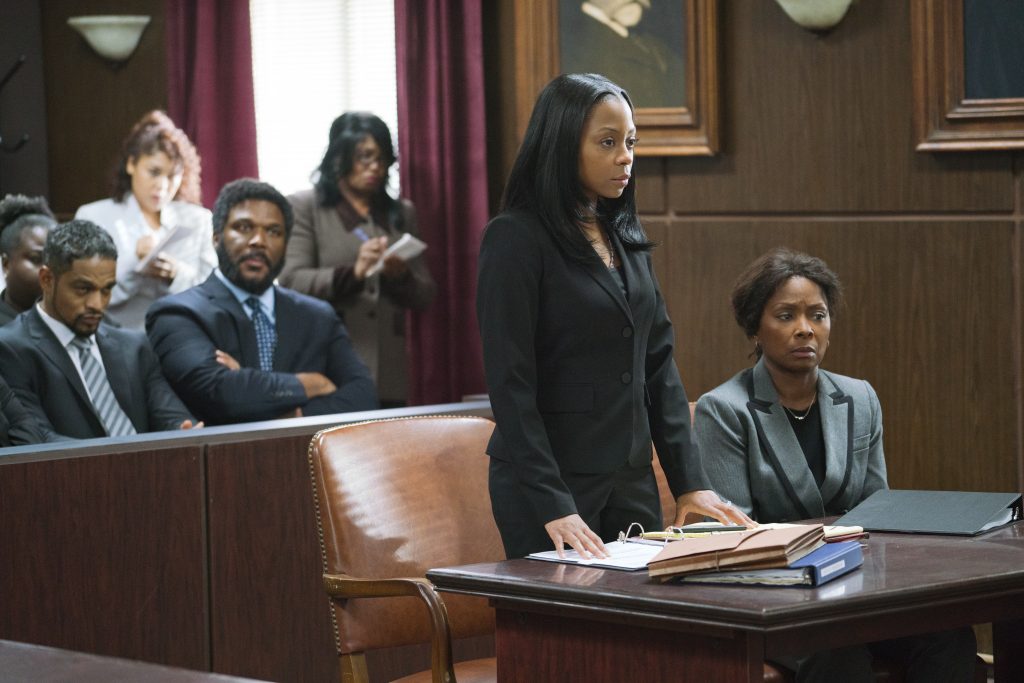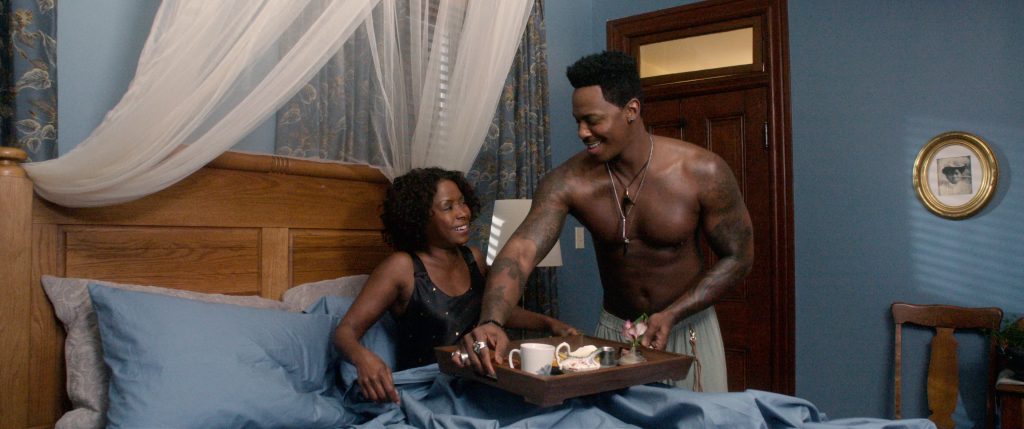June 19, 2021
by Carla Hay

“The House Next Door: Meet the Blacks 2”
Directed by Deon Taylor
Culture Representation: Taking place in Atlanta, the horror comedy film “The House Next Door: Meet the Blacks 2” features a predominantly African American cast of characters (with a few white people and Latinos) representing the middle-class.
Culture Clash: A married father and his bachelor cousin are convinced that their new next-door neighbor is a vampire.
Culture Audience: “The House Next Door: Meet the Blacks 2” will appeal primarily to people who don’t mind watching crass and unimaginative movies filled with derogatory name-calling of women and black people.

The good news is that “The House Next Door: Meet the Blacks 2” knows that it’s a silly and vulgar comedy. The bad news is that this movie fails miserably at being funny. This idiotic film also has rampant sexism and thinks that black people calling each other the “n” word is automatically supposed to make people laugh. It’s just a pathetic excuse for a comedy film.
“The House Next Door: Meet the Blacks 2” is the follow-up to the 2016 horror comedy “Meet the Blacks,” both directed and co-written by Deon Taylor, a filmmaker who’s known for churning out low-quality movies with predominantly African American casts. In “Meet the Blacks,” which Taylor co-wrote with Nicole DeMasi, the Black family relocated from Chicago to Beverly Hills, California, where they encountered horror that was ripped off directly from 2013’s “The Purge,” a movie about a United States where all crime is legal, for a designated 12-hour period one day out of the year.
In “The House Next Door: Meet the Blacks 2,” which Taylor co-wrote with Corey Harrell, the Black family is now in a horror scenario that’s a direct ripoff of the 1985 movie “Fright Night.” Family patriarch Carl Black (played by Mike Epps) and his goofy cousin Cronut (played by Lil Duval), a bachelor who lives in Carl’s backyard, begin to suspect that their new next-door neighbor is a vampire, but no one believes them at first. The other members of the Black family are Carl’s wife Lorena (played by Zulay Henao); their college-age daughter Allie (played by Bresha Webb); and their underage teen son Carl Jr. (played by Alex Henderson). Allie and Carl Jr. are Carl’s kids from a previous marriage.
Carl has a shady past as a thief. As seen in “Meet the Blacks,” he’s been trying to leave his criminal life behind. In the beginning of “The House Next Door: Meet the Blacks 2,” it’s mentioned that Carl wrote a best-selling non-fiction book about the horror he experienced that was shown in the “Meet the Blacks” movie. However, irresponsible Carl blew all the money he made from the book, and the family has now been forced to downsize to a smaller home in Atlanta. Carl is currently unemployed, while Lorena is the family’s breadwinner—and she’s very unhappy that she has to carry all the financial weight for the family.
Meanwhile, Cronut (who is also unemployed) lives in an oversized camper in the family’s backyard. It’s a promotional camper that’s left over from a book tour that Carl did, and it still has images of Carl and the book emblazoned on the sides of the camper. Carl has some hard feelings toward Cronut, because Cronut talked Carl into some bad business deals that led to Carl losing his money.
The family’s financial problems have resulted in Allie dropping out of college, because Carl wrote a tuition check that bounced. Allie is dating a disabled man, who’s about the same age as Allie, named Freezee (played by Andrew Bachelor, also known as King Bach), who uses arm braces in order to walk. Carl is very prejudiced against Freezee because Carl doesn’t want Allie to date a disabled man. Carl gets even more upset when Allie says she wants to move away and live with Freezee.
Cronut is immediately suspicious of the new neighbor Dr. Mamuwalde (played by Katt Williams, who’s styled to look like Leon Russell from the 1970s) because Dr. Mamuwalde moved into the house next door well past midnight, and the only activity in the house seems to happen at night. During the first house party that Dr. Mamuwalde has at his home, it looks like a swingers party is going on in the backyard. Dr. Mamuwalde also seems to be avoiding meeting his new neighbors.
When Dr. Mamuwalde surfaces, he is almost always seen with two scantily clad women named Salt (played by Sisse Marie) and Pepper (played by Shamea Morton), who are both dressed in lingerie and are mute for most of the movie. Dr. Mamuwalde has a creepy servant named Monty (played by Cory Zooman Miller), who gives vague answers about Dr. Mamuwalde when nosy Cronut goes over to pay a visit. Carl eventually encounters Monty too, and Carl also thinks that something unusual is going on at Dr. Mamuwalde’s house.
At first, Carl thinks Cronut has a wild imagination about Dr. Mamuwalde being a vampire. Carl thinks that Dr. Mamuwalde is probably a pimp. It turns out that Dr. Mamuwalde is a vampire and a pimp. Later in the movie, Dr. Mamuwalde kidnaps Lorena and Allie because he wants them to be his sex slaves. In a lowbrow comedy like this, would you expect anything else?
Other neighbors who are in this story are wide-eyed and fearful Rico (played by Tyrin Turner), who disappears and has a fate that’s very easy to predict; tough guy Hugo (played by Danny Trejo), who doesn’t say much, but he observes more than he lets on to other people; and married couple Clive (played by Gary Owen) and Bunny (played by Jena Frumes), who are both completely useless to the movie’s plot. Owen was in “Meet the Blacks,” but playing a different character named Larry. In “The House Next Door: Meet the Blacks 2,” Owen plays the token white guy who’s supposed to be racist.
Clive is a military veteran who uses a wheelchair and is a proud supporter of Donald Trump. (Clive wears a red “Make America Great Again” baseball cap, in case it wasn’t clear what his politics are.) Meanwhile, Bunny’s only purpose in the movie is to look like a basic Instagram model—she wears a bikini top and Daisy Duke cutoff shorts that leave little to the imagination—so that Carl and some other men can ogle her.
In fact, all of the women with significant speaking roles in the movie are exploited as sex objects at some point. Mother and daughter Lorena and Allie are both stripped down to their underwear in separate scenes. Not surprisingly, they’re wearing the type of lingerie that makes it look like they’re trying to be like Victoria’s Secret models.
Meanwhile, the men are fully clothed, except for one not-very-funny scene where a shirtless Cronut tries to seduce Bunny. There’s also a disgusting incest joke where Cronut suggests to his second cousin Allie that they have sex. He tells her that because they’re second cousins, it would be legal for them to have sex in Georgia. Not surprisingly, a repulsed Allie says no to Cronut’s sexual come-on.
Snoop Dogg has a small role, portraying himself as a TV talk show host who interviewed Carl in the past when Carl was promoting his book. One day, when a depressed Carl is at home, watching TV, and feeling sorry for himself, he sees an African man named Mr. Wooky (played by Michael Blackson) being interviewed on the show. Mr. Wooky claims to be a supernatural expert who can get rid of ghosts, vampires and other unwanted paranormal entities. Guess who Carl ends up hiring to get rid of the vampire next door?
All the so-called “jokes” in the movie are forgettable, and most are awful. Many of the jokes are about perpetuating the despicable and negative stereotype that black men hate themselves and don’t respect women. The visual effects are cheap-looking and not scary at all.
And all of the cast members are unremarkable in their roles, although Williams seems to be having some fun with his campy Dr. Mamuwalde character. Carl Jr. is barely in the movie; his total screen time is about five minutes. Rick Ross has a cameo as Mr. Saturday Night, who’s enlisted to help Carl and Cronut battle Dr. Mamuwalde. Mr. Saturday Night is another unnecessary character that was created just so the filmmakers could put hip-hop star Ross in the movie.
And a mid-credits scene announces the third movie in this series will be called “Chapter 3: The Ghost Squad,” starring Carl, Cronut, Mr. Wooky, Snoop Dogg and Hugo as the Ghetto Ghostbusters. Whether are not this “Ghost Squad” movie is really going to happen, you’ve been warned.
Lionsgate released “The House Next Door: Meet the Blacks 2” in select U.S. cinemas on June 11, 2021. The movie will be released on digital and VOD on July 9, 2021, and on Blu-ray and DVD on August 10, 2021.


